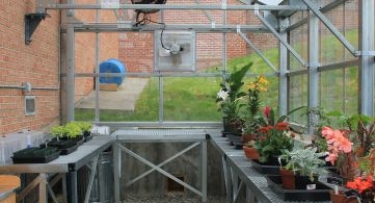Greenhouse Opens at Dobbs Ferry Campus

An adage says that people in glass houses shouldn’t throw stones.
But the people who have worked in or visited Mercy College’s new greenhouse agree – it rocks!
That was the feeling shared by Mercy faculty, staff and students on Friday, May 3, as a ribbon cutting ceremony was held to officially open the school’s new greenhouse. Several dozen students and staff, many of them from within the School of Health and Natural Sciences, attended the ceremony.
Visiting Assistant Professor Devdutta Deb’s biology students have been using the greenhouse and have begun to understand its importance to plant – and human – life.
“The greenhouse gives a very contained environment where we can showcase different kinds of plants that are out there,” she said. “You can study a lot of different aspects of plants, like their nutrition, productivity, and the effects of temperature and light on plants. The effects of using vitamins, fertilizers, hormones, and all of that, on plants. (Students) can see something from a basic stage – from a seed stage – and watch it grow into an entire plant. Lots of students have done basic gardening, but they don’t realize the importance of plants.”
Currently, three species of plants are being cultivated in the greenhouse: Thale cress, which is part of the Arabidopsis genus, a common model for studying plant biology, and one of the first plants to have its genome sequenced; Nicotiana, a genus of plants whose species include varieties of tobacco; and soybean plants. Deb explained that these plants are ideal for transient assays, genotyping, studying population density and various other tests and studies.
Future plans for the greenhouse may include growing vegetables and other produce to incorporate into Mercy’s cafeteria meals.
Carla Barahona ’22, a freshman majoring in biology and one of Deb’s students, spoke to the assembled crowd and explained how working in the greenhouse has impacted her interest in plants.
“I was never a fan of planting. As a child, I remember my parents did all the planting at our home … and I felt indifferent about it,” said Barahona, who is also a STEM Scholar at Mercy. “It wasn’t until just a few weeks ago that I became interested with planting, thanks to my professor, Dr. Deb. Overall, the experience was very therapeutic and fun. After what I experienced, I feel compelled to be involved with the greenhouse because there is so much to be shared about the way certain plants grow, their uses and their unique characteristics. The greenhouse will be an important part of the campus because everyone will witness how the plants we grow can be incorporated into our lives.”
Several students have assisted Deb with planting in the greenhouse; like Barahona, some have had little previous experience in the field. After they have the hands-on opportunities to discover how the tiny seeds can grow into larger plants and learn of the scientific aspects, Deb said their interest greatly increased.
“They got to do a lot on their own, and they really liked it,” she commented.
In addition to its role in fostering biological studies, Deb also explained how greenhouses can be used to teach agribusiness management. A group of Mercy’s STEM Scholars recently traveled to North Carolina and saw a larger greenhouse operation, where genetically modified rice, corn and wheat were grown and made resistant to pests and diseases.
“They saw the importance of all that, that when these (crops) come into the market, how useful it is for everyone,” Deb explained. “The population is ever increasing. We have to feed it all the time. You can teach them about plant diseases and make them understand a little bit about management, as well. You start small in a small greenhouse, and then you go big after that.”
Mercy College’s first greenhouse may be small compared to industrial ones, but if the students’ interest grows as fast as the plants, expect all parties to flourish.
